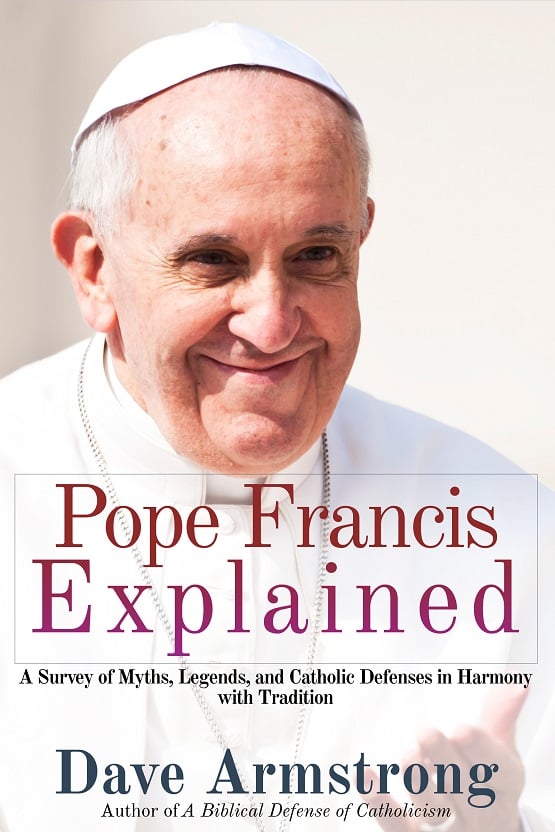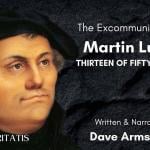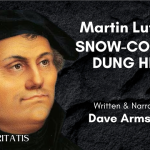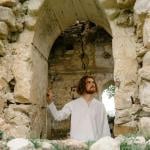
My good and esteemed friend and apologist-colleague and fellow Michigander Steve Ray wrote in a public Facebook post (2 May 2025): “We don’t need a successor of Pope Francis; we need a successor [of] St. Peter.” Then in the combox, he wrote, “Oh, I’m very clear. There’s a deeper meaning than the surface text. Think about it.”
After thirteen hours, this post has received 706 likes and 34 shares (sadly, par for the course for this sort of thing).
So I did think about it, and this is my reply:
. . . which of course Pope Francis was, so it’s a bit of self-contradictory reasoning. For the point (at least if taken literally) to be successful, one must presuppose the falsehood that Pope Francis was not a successor of St. Peter, which is pseudo-sedevacantism, or a lousy pope who bound the faithful to false teaching (which would be contrary to the very high level Vatican I teaching of papal indefectibility).
If Pope Francis in fact did not bind the faithful to heresy or even non-heretical error, then it seems to me that the entire point is null and void. If he did, then I request that we all be shown where this occurred. Even pope-basher Phil Lawler, author of the hit piece, Lost Shepherd: How Pope Francis is Misleading His Flock (2018), which I eviscerated in many critical reviews, denied that anyone has demonstrated that Pope Francis was guilty of any heresy. He wrote on 3 May 2019:
Is the Pope a heretic? I am not qualified to address that question. . . . Who could make the authoritative judgment that the Pope had fallen into heresy and therefore lost his authority? Certainly not a handful of independent scholars. . . .
Peter Kwasniewski, one of the principal authors of the letter, now says that the document lists “instances of heresy that cannot be denied.” This, I’m afraid, is a demonstrably false statement. The “instances of heresy” mentioned in the letter have been denied, and repeatedly. The authors of the letter are convinced of their own arguments, but they have not convinced others. In fact they have not convinced me, and if they cannot persuade a sympathetic reader, they are very unlikely to convince a skeptical world. . . .
See my article on this view of Lawler’s, with many links. In a follow-up letter of 16 May 2025, Lawler wrote: ““the authors of the open letter made a tactical mistake, because the charge of heresy is very difficult to prove . . .” Now, he may have changed his mind in the meantime, and adopted the brain-dead schismatic or quasi-schismatic mindset of Taylor Marshall or the excommunicate Vigano et al, but that’s what he thought then, at any rate. And he was correct.
So I respectfully dissent from my respected friend and fellow apologist and Michigander Steve. I simply couldn’t let a statement like this pass by without comment.
The anti-papal rhetoric — generally speaking now — will continue with the next pope: I have predicted for several years now. And it will because in my opinion as an apologist and longtime observer of the Christian community, it’s a quasi-Protestant and Americanist attitude of hyper-individualism and nitpicking the pope whatever he does, which is highly reminiscent of both Martin Luther and theologically liberal dissident Catholics. It incorporates fundamental errors of both the far right and the far left of the ecclesiological spectrum. We either have a pope whom we respect and follow or not.
That’s not to say that we must agree with absolutely everything he said: up to what color socks to wear (as I have often joked about). I respectfully disagreed with Pope Francis on a few political issues, such as immigration, the use of nuclear energy, and climate change. But that’s just it: those things aren’t faith and morals and not areas where the pope is infallible or even particularly an expert. The Holy Father himself drew this distinction in his great encyclical Laudato si (5-24-15), where he wrote, “the Church does not presume to settle scientific questions or to replace politics” [188].
I’m not an ultramontanist in the sense that St. Cardinal Newman opposed. I am an orthodox Catholic, who follows the pope as the infallible and indefectible vicar of Christ on earth, and yes, the successor of St. Peter. What has happened in the last twelve years among his nattering nabob critics is an absolute disgrace and a scandal. I have done my best to counter these grave errors, with 241 articles defending the pope (now it’s 242) and proving that his critics were mistaken, and also a collection of 342 articles from others doing the same thing. But no one can be convinced by something that they refuse to read or seriously consider, even if they do read it.
“You can lead the horse to water, but you can’t make it drink,” in other words . . . Jesus said several times, “He who has ears to hear, let him hear” (Lk 14:35). He was criticizing the refusal to hear, or obstinacy. Many Catholics today refuse to consider any defense of Pope Francis because they have bought all of the propaganda and the false narrative. The only winner here is the devil. He has divided and conquered once again and we have been stupid and blind enough to let him do it.
And the saddest thing of all is that it will continue in the next papacy, because nothing satisfies this sort of critical, unCatholic spirit . . .
Now, when I generalize about an error as I am doing here (putting on my “Catholic sociologist” hat) the danger is that some people may think that I am assuming low motives or bad faith in those who hold the position, and that I am engaging in personal attacks. THIS IS NOT TRUE AT ALL. A person can hold an erroneous position in completely good faith and sincerity, thinking they are doing good and on the side of the angels. I think this is true, for example, of Luther and Calvin. At the same time it can be in fact an objectively false and dangerous belief. The effect is the same. The well-intentioned person spreading what is a grave error produces the same bad fruit.
I know Steve (friends for 43 years) and I know his heart and his motivation for what he does. A person (like Steve) can do a tremendous amount of good work (as he has: which I immensely admire), but still simply be wrong on one point. In other words, it’s not a matter of overall character (a “good” or “bad” person) but (usually) of a good person who is simply wrong about a specific matter; has received erroneous teaching and accepted it. It’s not a matter of good vs. evil but of right vs. wrong thinking (lacking facts, logic, internal cohesion and consistency, etc.).
So I say that the vast majority of folks who follow this line of thought have simply fallen victim to bad thinking and analysis and perhaps also in some cases the enticements of the “bandwagon.” If a lot of people are saying a particular thing, then it’s very difficult to dissent from it and to not be one of the crowd. The anti-Francis bandwagon became very large indeed and infiltrated many otherwise respectable and helpful institutions and Catholic circles. We all like to be accepted and we don’t like controversy. I hate the latter myself. But my job requires me to be involved in it at times.
I try to always do so without any personal enmity whatever, as in this case.
*
***
*
Photo Credit: cover of my self-published book from 2014 [see book and purchase information]
Summary: Was Pope Francis a legitimate or worthy “successor” of St. Peter? The title of a Facebook post from my good friend & fellow apologist Steve Ray suggested otherwise & I replied.













